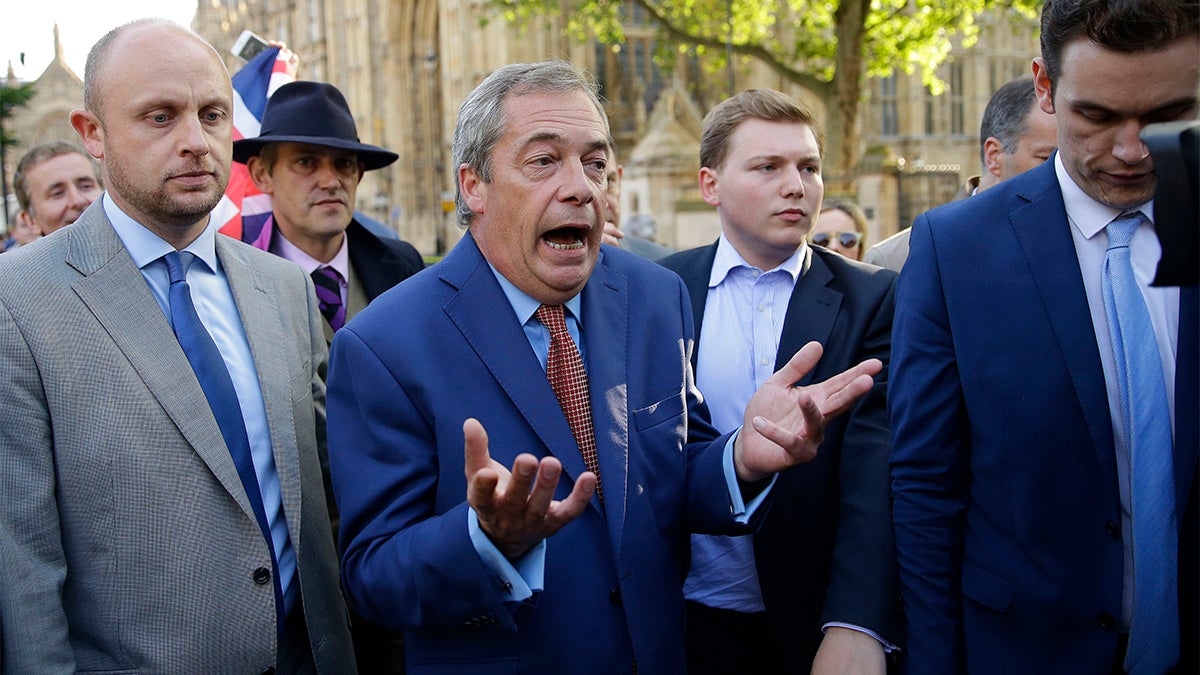Trump, Farage, and the racial lessons of Brexit

Nigel Farage
The strategy that led to the United Kingdom’s vote to leave the European Union is similar to that of presumptive Republican Presidential nominee Donald Trump.
The Brexit, you see, was about much more than the United Kingdom’s sovereignty. It was, in essence, a reaction to the influx of black and brown immigrants to the UK.
Simply put, the Brexit vote was driven in large part by race.
Nigel Farage, the leader of the conservative UK Independence Party, had been unsuccessfully fighting to have Britain to leave the EU for 25 years. Until recently, he’d been viewed as little more than a right wing annoyance. But the rise of ISIS and the subsequent destabilization of countries in Africa and the Middle East created a migrant crisis of staggering proportions. For Farage, it created an opportunity.
Last year, 630,000 foreign nationals settled into Britain. Another 330,000 have settled there so far this year. The influx of nearly a million people in such a short time stressed schools and housing, gave rise to anti-immigrant sentiment, and changed the political landscape.
Farage no longer had to argue that the UK should leave the EU for political reasons. Thanks to the arrival of Arab and North African migrants, the right wing leader could now argue his case based almost solely on race.
In one of the more famous posters that Farage used to promote the UK exit from the EU, thousands of migrants who appear to be Arab or North African are shown crossing the Croatia-Slovenia border in 2015.
“Breaking Point” the poster said. “The EU has failed us all. We must break free of the EU and take back control of our borders.”
The poster was widely condemned, with at least one political opponent saying it violated UK race laws by stoking racial hatred. Twitter users compared the image to Nazi propaganda footage of migrants shown in a 2005 BBC documentary.
None of that mattered in the end, because the poster and its racial messaging worked. Voters in the UK elected to leave the EU.
Now, with the British pound at its lowest value in over 30 years, and world markets in chaos after the Brexit result, voters in the UK are experiencing buyers remorse. As of Sunday morning, more than 3 million of them had signed an online petition requesting a revote.
But here in America, at least one politician who has campaigned on the same racial animus that fueled the Brexit vote is hailing the result. His name is Donald Trump.
In the wake of the vote, Trump stood in Scotland (which was against the Brexit, by the way) and said, “Look if the pound goes down, they’re gonna do more business. You know, when the pound goes down, more people are gonna come to Turnberry, frankly, and the pound has gone down, and let’s see what the impact of that is.”
In other words, Trump believes the economic woes of a key American ally are good for business. He also believes there are similarities between the factors that drove Brexit vote and the factors driving Trump’s presidential campaign.
“I think people really see a big parallel — a lot of people are talking about that,” Trump said. “And not only the United States, but other countries. People want to take their country back.”
Taking the country back is widely viewed as racial code language. Then again, Donald Trump, like Nigel Farage, has frequently leaned on racial and ethnic resentments to drive his political success.
In promising to make Mexico pay for a wall along the southern border of the United States, Trump called Mexicans who illegally cross the American border rapists and killers. Trump said a federal judge’s Mexican ethnicity affects the judge’s ability to be impartial in a fraud lawsuit against Trump University. Trump has called for a ban on Muslims immigrating to the United States. Trump has intimated that a Black Lives Matter protester who was beaten at one of Trump’s political rallies deserved to be roughed up.
These and other xenophobic Trump pronouncements were initially dismissed as reality show-style theatrics. Then Trump garnered 14 million votes en route to winning the Republican presidential primary, and America was forced to take him seriously.
If we are wise, we won’t make the mistakes that were made in the days and months leading up to the Brexit vote. We won’t underestimate Donald Trump as the UK did Nigel Farage. We won’t misjudge the power of racial resentment as the political establishment did in the UK. We won’t continue to dismiss xenophobia as a cheap publicity stunt.
If we do, we face the prospect of waking up to the same political and economic chaos that is now gripping the UK.
Regardless of one’s political affiliation, I doubt anyone in America wants that.
Listen to Solomon Jones weekdays from 7 to 10 am on 900 am WURD
WHYY is your source for fact-based, in-depth journalism and information. As a nonprofit organization, we rely on financial support from readers like you. Please give today.


